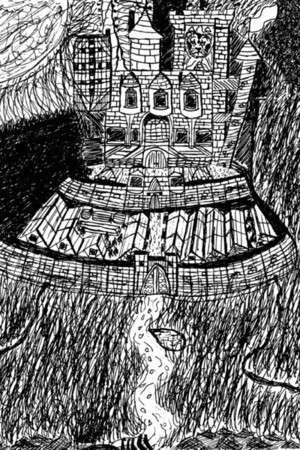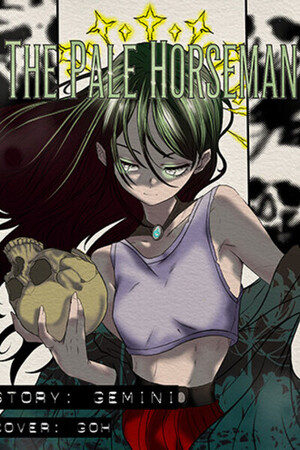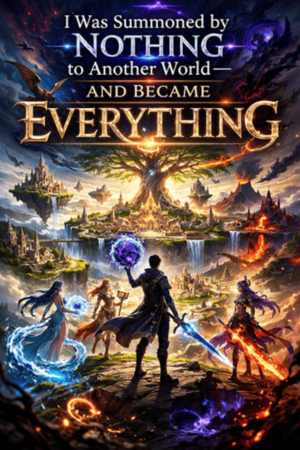Chapter 22:
Ghost Stories
Powerlust: Unstable Grounds
The Mysterious Minstrel
The bard rode down the road, atop their mule. A mule named Don Orre. Don was covered in saddlebags filled high with all the bard's many instruments and travel supplies.
It was a long and arduous journey from Doubling to Castle Hill. There was only one well-worn road, and it was seldom traveled. Wolves, both man and beast, were said to hunt those who traveled these trails.
But the bard was not worried. The bard had dealt with bandits my times over. These "Wolves" were no different. They all wanted the same things: gold, booze, and merriment. The bard was all out of the first two but had merriment in spades. Still, it was growing dark. Perhaps it would be wise to stop and settle soon. The bard had been traveling all day.
The bard wanted to arrive in Castle Hill before the Harvest Festival began in earnest. The bard always enjoyed the festival and was well delighted that the fighting had died down enough to hold the celebration. It would have been a long, long journey for nothing if it had been. This was one of the bard's best chances to make some coin.
The bard came across a clearing along the side of the road. There three dark komodon were hitched to some trees. The bard brought Don to a halt. Three figures emerged from within the treeline. Bandits? None had the look of Wolves. The three were all quite dissimilar.
To the right of the trio was a woman. No, a girl. She was the tallest of the three but clearly quite young. She had bright hair the colour of the turning leaves. It flowed down past her shoulders. Her skin was green as moss. She wore the garb of the Inland Tribes of Orre. Leathers armour with a tartan kilt. She carried a long wooden spear, or maybe a javelin, covered in moss, or maybe Rott. She wore a targe strapped to her left arm and bracers on both wrists.
To the left of the trio was an older man, a head shorter than the girl. He wore mail with assorted plates and a royal blue surcoat decorated with the white sunburst compass, which the bard recognized as a symbol of the Helian faith. Most likely a holy knight from the look of him. He was balding, with his remaining black hair going grey. He wore a mustache and a goatee shadowed in grey stubble upon his withered face.
The man in the middle was smaller and shorter still. He was dressed like a nobleman in a fine crimson coat, a spotless neckerchief, a frilled shirt, and brown trousers. A big Dane ax, polished to sickly sharpness, slung across his back. The massive axe looked terribly out of place and did not fit his look at all. He wore proudly the badge of the Justiciar. A big golden crown with a crossed sword and an ax. That told all the tale the bard need hear. This man was dangerous.
They were all dangerous. All three of them.
"Are you Wolves?" The bard asked, knowing well the answer.
"Not quite." The old man answered, not unkindly. "Though we did happen upon a few a ways back. Those particular bandits will not be bothering you," the knight said, gesturing down the road from whence the bard had come.
"How did someone like you, a songseller, end up with a horse? Did you steal it? Not even our holy man here has a horse," the justiciar calmly accused. The bard knew such a crime, as he accused, had only one punishment. That punishment was death.
"No, m'Lord. I have my license here. It's a mule, truly. Infertile and old. But he serves me quite well. Don Orre, I call him," the bard went to get the license from one of the saddle bags.
"You named this beast in open mockery of your late King," the Justiciar raised both his body and voice, clearly well agitated. The bard went still. He was not looking for a license. He was looking for a fight. The King was a swore subject for him, perhaps. A man like him needed someone to serve even more than he needed those below him to trample upon.
"And you shall refer to me by my proper title, commoner. It is Lord Justice. None of this m'Lord nonsense or I'll take out your tongue." The threat was not an empty one. His hand reached for and rested loosely on his gnarled dirk. There was murder in his eyes.
"Not at all, Lord Justice. I named him in his Majesty's memory. In his honour, truly. And in honour of his great house, land, and people," the bard insisted.
"The land is not his, not truly," the girl grumbled.
"Quiet girl. Clamp your tongue or I'll have off with it as well. None of this free slander. Don't think I won't. Even my benevolence has its limits," The justiciar spat sickly. His hand remained on his dirk's hilt. His eyes nakedly displayed his murderous intent toward his companion as well.
The knight was watching the Justiciar closely and unflinchingly. His eyes narrowed in distaste. The warrior women wisely went silent and avoided eye contact. Everyone was silent for some time. They were all holding their breath.
Finally, after much too long, the Justiciar wandered off, rambling something to himself. The tension left with him and the air returned. Everyone breathed in. Just like that, it was over. No blood would be drawn just yet.
"Care to join us. We are just about to make camp." They were dangerous, but these two didn't seem to mean any harm. And it wasn't any less dangerous to be alone along this road by night. If the bard wasn't with them, the Justiciar would have more license to enact his violent intent on either of them. The bard would rather risk the Justiciar's wrath in the knight's presence than alone. Not even accounting for the Wolves. The bard reluctantly nodded acceptance of the man's offer.
"Wonderful. Allow us to acquaint ourselves. I am Sier Pablo, a knights paladin of the Pax Church. This powerful young lady here is Chieftess Bo, warrior of the Inland Orre Clans. Our charming leader back there was none other than Grand Justiciar Holmes," the knight gestured off to wherever the Justiciar had gone to clear his head.
"Please to make your acquaintance, Sier. I am but a humble minstrel. I have no name worth knowing," the bard customarily curtsied.
The knight began to fix a fire in the pit the girl had prepared. He rubbed his hands together in a quiet prayer and then rubbed harder and faster until they sparked. Fire formed on either palm, like oil on water. He set his hands to the wood, and it rushed ablaze. He did all this without the aid of any Sparker Rings. He was clearly a powerful Pyro. No doubt his faith burned brightly.
"The thing that distinguishes the Pax Church from the Helian Church is how we observe our flame. The Helian Church says that when Helios rests, so must his flame. To act otherwise, they believe, is an affront to his gift. The Pax Church sees it somewhat differently. We see it as a gift he leaves us behind to keep us warm. We eat, see, and celebrate by the light of his gift until he returns. Many a war has been fought and many a man has died over this divide," the knight preached. He scooped his hands into the flame and emerged with a spark. It grew into a fire. He danced a flame about his hands, jumping to and fro, each spinning it like a ball, performing tricks. All without the aid of Sparker rings. The bard could make a lot of money with that trick. "Where are you traveling?" the knight questioned, staring intently deep into the flames.
"From Doubling, Sier, to anywhere that can afford a song," the bard readily replied.
"Then you'd best turn right around and head back. This forsaken land is sick and poor and starving. The Duke claims to be a man of great faith, but his people kill one another and starve." The flames of the fire danced in the knight's eyes.
The bard knew it well. Castle Hill was one of the few fertile farms left. The Chaff Sea sustained them both, the people and the land. Perhaps that was why the Duke fought so hard to claim and defend it. The bard was headed that way for the Festival but knew not to divulge that information. Not if the knight didn't ask it. He would likely see through a lie. Holy knights were like that.
"What of you, old knight? Have you a tale? I am always seeking great stories to spread," the bard inquired.
"I have no great tale nor epic. I have but a humble one. When I was a boy, my family was quite poor and sick. But we still made it to church every day. Never failed. When my mother got sick, it was the church that took me in. They raised me to be a monk or perhaps a priest. When I showed the gift..." The knight forged the flame in his palms into an unnatural orb. It illuminated his face fully. Its warmth was so great the bard could feel it.
"I showed great promise in both my studies and gift," the knight continued. "I worked my way up and began to heal and feed the poor. I couldn't save my mother, but I could save others."
"I was called by the church to serve, to fight, so I did, though I only wished to heal. Still, I fought and I killed. I killed many and more. My mace made many holy men fall and never return to their families, their children. I prayed for everyone one of them. I still do. I see them all when I close my eyes each night," the knight relayed repentantly.
"And you, m'Lady?" the bard asked in an effort to relieve the knight of his duty to disclose.
"I am no lady. Just a chieftess. Even that I am no more. I have no clan. I am but a wandering warrior. I was banished from my clan after my father, the chieftain, was defeated by a rival clan leader. I challenged him after my father fell as my clan's chieftess, but he only laughed at me. I made him stop laughing, but still, he refused to grant me a warrior's death. Instead, he banished me. Our clans merged into one, and my people became his. I lost everything. I served the King, for he promised me my land, my people, and my revenge if I did. One day, once I am strong enough, I will return home, kill him, and reclaim my people," the warrior said with fire reflecting off her eyes.
"And you, Lord Grand Justice?" the bard asked, careful not to make the temperamental man feel excluded. He had just then returned from his sulking. He seemed to have calmed himself at least.
"There's nothing to tell." He sat and lazily poked at the fire with a stick. "I carry out the King's Justice. The Duke violated the most natural law by rebelling against his betters. There is a natural order, a hierarchy. You, minstrel, are at the bottom. Women and children, too. Kings and emperors are on top. It's my duty to make sure everyone stays where they belong. Because once the bottom starts trying to climb to the top, the whole tower falls. Anarchy." He tossed the stick into the blaze.
The badge of a justiciar. It was a license to judge, to kill with impunity, to hire an army on the King's dime, and much, much more. The power of that pin was greater than any song or sword, armour or maegic. It was real power. The power to do as he saw fit. And this man, like so many men, didn't see fitly at all. The man wielded his power every bit like the weapon it was. He didn't see the old knight and the warrior girl as his companions, but as his pawns. They were deputies to help him overcome those who resisted him. Those with the physical and psychological strength to resist him.
Of course, there was no king now. The one man who could hold a Justiciar to account. Except perhaps another Justiciar, though they never did. The rule was unspoken. Now the madman had lost most of his power: the strength of his immunity and protection. He was in a country where the dead King's name meant little and less to most. It drew ire from much of the remainder. If he were down south, maybe he would have more allies, but here he was without the power that had defined his life. The only thing between him and the "savages" was his knight and his warrior, charged by their fallen king, under this monster's command, with a mission of vengeance from beyond the grave. They clearly took no delight in it. But they were soldiers, and they would follow their orders. Of that much the bard was certain.
"What of you, minstrel?" questioned the curious knight.
"I am much like any other minstrel. I travel the Isles selling my songs and stories. I play, I sing, I dance. I come and go. I hear all and see nothing," the bard bellowed. "What is your quest from the King?"
"That is quite simple," the knight answered with a smile as he returned his fireball to its source. The light of the campfire illuminated all their tired faces. The old knight's face was earnest. The warrior's face was solemn. The Justiciar's face was cruel. He wanted the pleasure of the kill.
"We three are going to kill the Duke," the knight stated as if it were nothing worthy of note.
"Play us something, minstrel," the Justiciar demanded. The bard had expected this. The bard grabbed for the lute, the first instrument the bard had ever learned and, since then, the best. The bard began to pipe out a sad song.
The flames of the fire began to take shapes of silhouettes. A story danced in the flames. They danced not as flames but as people do. To the melody of the music. Red and orange and yellow and blue and white. The bard couldn't say if it was the song, the knight, or the flames themselves that caused such a scene. Perhaps it was even a Faerie spirit of the forest or Helios himself.
The old knight smiled warmly as the song concluded. He silently watched the dancing flames die down. They all went silent once again. Just the cracking of the wood in the fire, the wind in the trees, and the hoppers in the grass sounded.
Eventually, the silence was broken when the Justiciar muttered something about going to sleep and wandered to his bedroll. The bar, the knight, and the sat there watching the flames, fighting a fiery war. They all watched until the very last flaming soldiers died out. They all slept soundly.
By the morning light, the party had departed.




Please sign in to leave a comment.